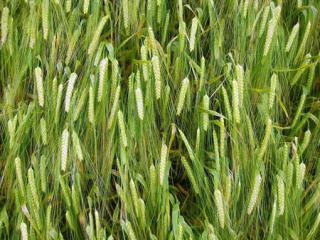Latest Briefing in Food, health and wellbeing for 2014

Integrated Disease Management in Spring Barley
Intergrated Disease Management (IDM) could help greatly reduce the volume of crops lost to disease in Scotland, contributing to our future food security. It works by integrating plant resistance, fungicides, cultural methods such as appropriate use of fertilisers, and newer, innovative approaches, to provide effective and sustainable disease control.
In Scotland, barley is the second most important crop after grass, with nearly 300,000 ha grown in 2012, with a net value of £315 million. Diseases represent a major constraint to barley production globally, despite considerable effort to control the pathogens responsible. The ability of pathogens to overcome host resistance, development of pathogen insensitivity to fungicides, and the increasing importance of pathogens thought previously to be of minor significance, means that diseases will continue to pose a threat to global barley production.
These constraints, coupled with increasing legislation aimed at protecting the environment, have led to increased efforts to find more sustainable approaches to disease control. Such approaches clearly need to balance protecting the crop from threats such as diseases, pests and weeds, with the need to minimise environmental damage, and requires an integrated approach to crop protection.
IDM represents such an approach and is a continuously improving process in which innovative solutions are integrated and adapted locally by growers. By offering a broad spectrum, integrated approach to disease control, IDM will contribute to reducing reliance on pesticides in agricultural systems.
Read morePublished on 16 December 2014 in Climate, water and energy , Ecosystems and biodiversity , Food, health and wellbeing
Briefings in Food, health and wellbeing for 2014
On-Farm Assessment of Soil Carbon Status
Soil Organic Matter (or soil carbon) is of significant importance, in terms of soil fertility, water retention, structure and biodiversity. Read more
Published on 4 September 2014 in Sustainability and Communities , Food, health and wellbeing
The Impact of Animal Health Status on Greenhouse Gas Emissions from Livestock
Ruminant livestock production is a key contributor to the rural and national economy of Scotland, as well as the world-renowned Scottish Food and Drink industry. Read more
Published on 8 July 2014 in Climate, water and energy , Food, health and wellbeing
The Journey from Genes to Plant Traits Reveal a Flexible Response to a Changing Environment
To address the challenges brought about by the impact of climate change and our increasing reliability on plant based food, fuel and materials, requires an understanding of molecular processes that underlie crop responses to environmental stresses. Read more
Published on 1 May 2014 in Climate, water and energy , Food, health and wellbeing
Improving Food Security and Nutrition Through Fisheries and Aquaculture
The aim of this strand of research is to assess the efficiency and sustainability of the food supply chain and food security in Scotland. Read more
Published on 24 April 2014 in Food, health and wellbeing
Electronic Identification as a tool for Precision Livestock Management
The aim of this brief is to present some ideas on how to use EID as a management tool in beef and sheep systems, based on research, demonstration and knowledge exchange activities conducted by research staff at SRUC's Hill & Mountain Research Centre, Kirkton and Auchtertyre research farms. Read more
Published on 24 March 2014 in Sustainability and Communities , Food, health and wellbeing
Can Deer Management Help Control Ticks and Tick-borne Diseases?
The impact of reducing deer numbers by fencing or culling was shown to have an impact on tick abundance, this research showed. Read more
Published on 24 February 2014 in Sustainability and Communities , Food, health and wellbeing
Controlling Ticks by Treating Deer with Acaricides
This research used a mathematical modelling approach to explore whether treating deer with acaricide could, in theory, be an effective way of controlling ticks as an alternative to culling deer. Read more
Published on 21 February 2014 in Sustainability and Communities , Food, health and wellbeing
Peatland Restoration may aid the Ecosystem Service of Regulating Pests and Disease
This research looked at the impact on tick numbers when forestry was felled and the land restored to peatlands. Read more
Published on 19 February 2014 in Sustainability and Communities , Food, health and wellbeing
The Childbearing Years: A Teachable Moment for Weight Control?
The inter-pregnancy period may be a teachable moment when women are more receptive to guidance to achieve or maintain a healthy weight and thereby optimise pregnancy outcome in their second and subsequent pregnancies. Read more
Published on 6 February 2014 in Food, health and wellbeing
Breeding For Climate Change: Future-Proofing The Scottish Potato Industry
The ability to adapt potato to withstand multiple pest, pathogens and environmental stresses is critical to its future growth as a major food source. Read more
Published on 27 January 2014 in Sustainability and Communities , Climate, water and energy , Food, health and wellbeing







